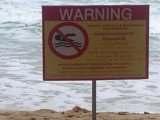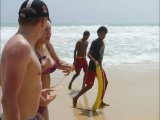Phuket authorities were meeting at Phuket Provincial Hall in Phuket City this morning at a gathering chaired by Phuket Governor Maitree Intrusud to discuss the needless deaths.
Lifeguards rescued more than 100 people from Phuket's famous west coast beaches last week and today a spokeswoman asked for volunteers to help to stop the drownings.
In the latest tragedy, family and friends of Peerapon Nunark, 19, kept a vigil until darkness fell over Layan beach last night.
Today their hopes were dashed when the young man's body was found and recovered offshore of Phuket's west coast, where tourists from India, Belgium and Russia have also drowned since Thursday.
The succession of tragedies is likely to bring to a head continuing concerns that Phuket fails to do enough to prevent drownings in the dangerous onset of the monsoon season.
The deaths are certain to be raised when ambassadors from Europe, Australia and probably China meet with Thailand's Minister for Tourism and Sport in Bangkok on Friday.
The faces of Khun Peerapon's family and friends were filled with anguish as they stood hoping for his safe return at Layan beach yesterday.
His mother, Wasana Janpen, said: ''Peerapon was with five friends at the family picnic. We watched him wave for help. Then he was gone.''
She could not explain why the swimmers had chosen to ignore red flags and warnings from lifeguards. It's a common problem that occurs when people reach Phuket's beaches, determined to swim.
Water safety experts say that lifeguards are only one part of Phuket's needs to protect swimmers at this time of the year.
The four drownings in four days have been accompanied by other drownings and the death of one Chinese tourist from a speedboat propeller since May.
Eight tourists drowned on Phuket's beaches between mid-May and mid-July last year but this year it was again left just to the lifeguards to protect swimmers.
The water safety experts have called for warnings at Phuket airport, on arrival at resorts and guesthouses, and on the beaches for those who still plan on risking their lives.
June 24 Phuket authorities react by holding a crisis meeting at Phuket Provincial Hall in Phuket City.
June 23 A young Phuket man becomes drowning number four in four days when he disappears beneath the surf at Layan beach.
June 22 Indian tourist Ramesh Chand Singhal, 49, goes into the surf at Kata with a bodyboard and drowns.
June 20 Two drownings within one hour as Belgian Laurent Jacques Leopold Wanter, 42, drowns at Laem Singh beach and Aleksande Poleshchenko, 29, drowns soon after at Patong beach.
June 19 Chinese tourist Chen Peng, 36, dies afterv being struck by a speedboat propeller in the water at scenic Pileh Bay, near Phi Phi.
June 18 Chinese tourist Ran Li, 23, drowns on a day-trip outing to Racha island.
June 14 Eighteen European envoys meet on Phuket and request more effort to improve marine and beach safety.
May 29 Chinese Ambassador Guan Mu makes a strong public plea on Phuket for more warnings - at the airport, at resorts and at beaches - to save more lives.
May 28 A Young Chinese tourist drowns on a day-trip from Phuket to Pai island.
May 21 British tourist Jeremy Thomas O'Neill, 37, is found dead on Patong beach about 6am. It is believed he may have misjudged the strength of the waves in darkness.
























I believe the most important thing to do is to provide potential tourists with accurate information about dangers relating to Phuket beaches BEFORE they purchase their trips.
When they arrive on Phuket, it's too late. Imagine the disappointment of an anticipated beach holiday, only be told after a 10+ hrs flight that it's not safe to swim on the beaches.
Promoting the numerous and extensive pool facilities many midrange and upscale hotels have would be the perfect alternative in low season.
Posted by ThaiMike on June 24, 2013 13:00
Editor Comment:
What you are asking is for Phuket to become the first tourist destination in the world to try to prevent visitors from coming. That's plainly unlikely and an unreasonable suggestion. Preventative action in destinations that have problems of one kind or another rightly begins once the aircraft has landed. Until then, it's up to the individual traveller to look at all pros and cons, as well as the prices.